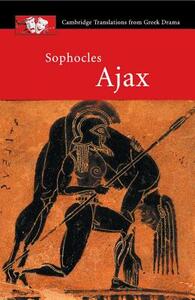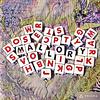Take a photo of a barcode or cover
Nije mi baš stalo do slušanja čovjeka koji kuka dok se ubija.
Probably my favorite of the Sophocles plays that I’ve read. Tightest action and I think the neatest. No happy ending, but no deus ex machina either.
Ajax is such a drama queen! And Teucer isn't much better. Odysseus is awesome as always, Agamemnon and Menelaus weren't as insufferable as usual, and the Chorus Leader is a new favorite of mine. Oh, and Tecmessa was so annoying.
Best exchange:
Teucer: "O my dear brother Ajax, have you come / to grief, as this strong rumor says you have?"
Chorus Leader: "He is dead, Teucer. Know the simple truth."
T: "Then my ill luck is bearing heavily down!"
CL: "It is true."
T: "Ah, I am miserable!"
CL: "You may well groan."
T: "So rash and calamitous!"
CL: "Yes, Teucer."
I can FEEL the Chorus Leader rolling his eyes. It's great.
Best exchange:
Teucer: "O my dear brother Ajax, have you come / to grief, as this strong rumor says you have?"
Chorus Leader: "He is dead, Teucer. Know the simple truth."
T: "Then my ill luck is bearing heavily down!"
CL: "It is true."
T: "Ah, I am miserable!"
CL: "You may well groan."
T: "So rash and calamitous!"
CL: "Yes, Teucer."
I can FEEL the Chorus Leader rolling his eyes. It's great.
I read the Bryan Doerries translation from “All That You’ve Seen Here is God”
eh. from the plays i've read so far this probably is the least interesting one - and i'm sure a huge part of that is just me being a modern reader and feeling a bit too disconnected with what sophocles is telling. spoilers ahead btw - the whole play hinges on how how ajax was disrespected by not being given achilles' armor and if he deserves to be buried after betraying his friends.
again, i feel like i'm missing something. aside from the weirdness i get from tecmessa's character (probably because she's written by sophocles so there's no depth and all i keep thinking is he's writing her as a slave in love with him and it just feels weird to me), ajax's actions to what happened doesn't feel proportional to me, but again, i can't help but wonder if it's because i'm missing some cultural importance for the ancient greeks. or maybe not! i don't know! again, i've said this, but i'm not a classical student or have classical education, i just find these fun to read, but that means there's plenty context that i simply don't know.
again, i feel like i'm missing something. aside from the weirdness i get from tecmessa's character (probably because she's written by sophocles so there's no depth and all i keep thinking is he's writing her as a slave in love with him and it just feels weird to me), ajax's actions to what happened doesn't feel proportional to me, but again, i can't help but wonder if it's because i'm missing some cultural importance for the ancient greeks. or maybe not! i don't know! again, i've said this, but i'm not a classical student or have classical education, i just find these fun to read, but that means there's plenty context that i simply don't know.
Well, the bit where mental illness is so shameful that you should probably kill yourself over it and the misogyny from Ajax's basic testosterone-poisoning is not a good 21st century look, but the part where multiple frenemies (Menelaus, Agamemnon, then Odysseus) come around to be like: "this guy was an asshole" but the one Ajax hated the most is like, listen, we should just not be assholes back now that he's dead -- I don't know, that part's kind of hilarious.
adventurous
dark
emotional
reflective
sad
fast-paced
Plot or Character Driven:
Character
Strong character development:
Complicated
Loveable characters:
Yes
Diverse cast of characters:
No
Flaws of characters a main focus:
Yes
dark
emotional
sad
fast-paced
Updating my review because my appreciation for this play has only increased over time. I chose Ajax's myth and this play to explore for part of my final essay at university because I loved it so much. For me, it is the best ancient Greek play I have read thus far, and one that I will continue to recommend.
Ajax's madness and consequent suicide may seem like an irrational response to somewhat of a minor problem, but there are so many layers to it that we can't ignore.
In his anger at not being awarded Achilles' armour after the Trojan War, he embarks on a killing spree against the Athenian soldiers. However, Athena's divine intervention means that he actually kills a flock of sheep. Yes that may be good because now he's not a murderer, but actually, he is now just a raging lunatic bragging about the crime he has committed, and Athena lets him do so. But when he finds out that he is nothing more than a mad man in the eyes of his comrades, he feels he has been dishonoured, and that his name and his image cannot be saved. In the Iliad he was an esteemed warrior, and was feared. He lived, and was willing to die by, the Greek honour code - he would put his life on the line for his fellow soldiers, and he even went back for Achilles' body when Odysseus went off to fight Paris, the murderer of Achilles. And despite his very risky boasting that he does not need divine help, and that he is the second best warrior to Achilles, he eventually has to face the reality that not only has the legacy of Achilles been passed onto Odysseus and not him, but that Athena has very clearly shown to everyone that this so-called great soldier is now nothing but a weak, angry, and dishonoured man. And though Ajax's wife pleads for him to see reason, to stay for her and their son, he cannot shake the feeling that the only way for him to gain back the honour of his name, and thus for his son, is to do so in death. For ancient Greeks, honour was bestowed on an individual through proper burial rites, and despite Agamemnon's opinion that Ajax's body should simply be thrown to the gulls, the honourable Odysseus remembers his actions in the Trojan War, and feels that he deserves honour in death. And so, after Ajax throws himself onto his sword - the one previously given to him in battle by Hector after they drew in a fight - he is buried properly, and honourably. In real life, his honourable actions in the Trojan War was even celebrated through a festival called Aianteia in his hometown, Salamis :')
This short and sweet play is nothing short of dramatic, and beautifully written. Where it seems to others that Ajax is blinded by his hubris (excessive pride), we must remember the divine intervention which shapes his actions - and these careless touches on the lives of mortals are often detrimental to those who live and act with such force.When madness hinders Ajax's ability to see reason, suicide is an attempt at getting back his honour, and control of his life again.
Poetic, sad, dark, emotional, and dramatic.
Hopefully in time I will read other translations!
This short and sweet play is nothing short of dramatic, and beautifully written. Where it seems to others that Ajax is blinded by his hubris (excessive pride), we must remember the divine intervention which shapes his actions - and these careless touches on the lives of mortals are often detrimental to those who live and act with such force.
Poetic, sad, dark, emotional, and dramatic.
Hopefully in time I will read other translations!
"It makes me see that we who live and breathe
are nothing more than phantoms,
or insubstantial shadowings."
"For kindness breeds new kindness,
ever back and forth."
And I think this quote sums up Ajax as a character pretty well...
"For those who have bad judgement never know
the good they hold until it's thrown away."
really really loving greek tragedy at the moment.
this felt very differnet to oedipus and antigone - sophocles gives us longer speeches as well as the snappy exchanges between characters, which i very much appreciated. this play offers a good depiction of what is left behind after death - specifically suicide - and the importance of the physical body, as well as the soul.
this felt very differnet to oedipus and antigone - sophocles gives us longer speeches as well as the snappy exchanges between characters, which i very much appreciated. this play offers a good depiction of what is left behind after death - specifically suicide - and the importance of the physical body, as well as the soul.
"Muitas coisas, depois de as verem, podem os mortais saber, mas antes de ver, ninguém adivinha o que fará no futuro."





